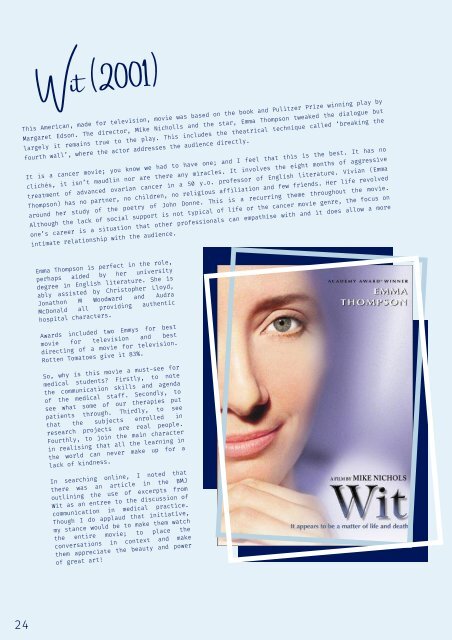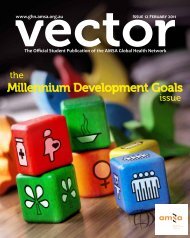PANACEA 2020
panacea /ˌpanəˈsiːə/ noun a solution or remedy for all difficulties or diseases. The term ‘Panacea’ embodies humanity’s unfaltering idealism, our wishful thinking and our unattainable dreams. It is this idealism which lays the foundation for our ambition and perseverance in the face of unparalleled hardship, and which fuels our resilience after defeat. In a time like the present and indeed throughout history, the concept of a ‘Panacea’ has been a frank deviation from reality – it is nothing more than a fantasy or escape. Nonetheless, for us, ‘Panacea’ is a delight, a source of hope and a symbol of our unending optimism. This year, the theme of AMSA’s student magazine, Panacea, is “When the dust settles: Reflection and renewal in a COVID-19 world.” We asked medical students from across Australia to submit written pieces or artwork relevant to the theme, for publication in a colourful and engaging digital magazine. Please enjoy the compilation of these wonderful works in Panacea 2020.
panacea
/ˌpanəˈsiːə/
noun
a solution or remedy for all difficulties or diseases.
The term ‘Panacea’ embodies humanity’s unfaltering idealism, our wishful thinking and our unattainable dreams. It is this idealism which lays the foundation for our ambition and perseverance in the face of unparalleled hardship, and which fuels our resilience after defeat. In a time like the present and indeed throughout history, the concept of a ‘Panacea’ has been a frank deviation from reality – it is nothing more than a fantasy or escape. Nonetheless, for us, ‘Panacea’ is a delight, a source of hope and a symbol of our unending optimism.
This year, the theme of AMSA’s student magazine, Panacea, is “When the dust settles: Reflection and renewal in a COVID-19 world.” We asked medical students from across Australia to submit written pieces or artwork relevant to the theme, for publication in a colourful and engaging digital magazine. Please enjoy the compilation of these wonderful works in Panacea 2020.
You also want an ePaper? Increase the reach of your titles
YUMPU automatically turns print PDFs into web optimized ePapers that Google loves.
Wit (2001)<br />
This American, made for television, movie was based on the book and Pulitzer Prize winning play by<br />
Margaret Edson. The director, Mike Nicholls and the star, Emma Thompson tweaked the dialogue but<br />
largely it remains true to the play. This includes the theatrical technique called ‘breaking the<br />
fourth wall’, where the actor addresses the audience directly.<br />
It is a cancer movie; you know we had to have one; and I feel that this is the best. It has no<br />
clichés, it isn’t maudlin nor are there any miracles. It involves the eight months of aggressive<br />
treatment of advanced ovarian cancer in a 50 y.o. professor of English literature. Vivian (Emma<br />
Thompson) has no partner, no children, no religious affiliation and few friends. Her life revolved<br />
around her study of the poetry of John Donne. This is a recurring theme throughout the movie.<br />
Although the lack of social support is not typical of life or the cancer movie genre, the focus on<br />
one’s career is a situation that other professionals can empathise with and it does allow a more<br />
intimate relationship with the audience.<br />
Emma Thompson is perfect in the role,<br />
perhaps aided by her university<br />
degree in English literature. She is<br />
ably assisted by Christopher Lloyd,<br />
Jonathon M Woodward and Audra<br />
McDonald all providing authentic<br />
hospital characters.<br />
Awards included two Emmys for best<br />
movie for television and best<br />
directing of a movie for television.<br />
Rotten Tomatoes give it 83%.<br />
So, why is this movie a must-see for<br />
medical students? Firstly, to note<br />
the communication skills and agenda<br />
of the medical staff. Secondly, to<br />
see what some of our therapies put<br />
patients through. Thirdly, to see<br />
that the subjects enrolled in<br />
research projects are real people.<br />
Fourthly, to join the main character<br />
in realising that all the learning in<br />
the world can never make up for a<br />
lack of kindness.<br />
In searching online, I noted that<br />
there was an article in the BMJ<br />
outlining the use of excerpts from<br />
Wit as an entree to the discussion of<br />
communication in medical practice.<br />
Though I do applaud that initiative,<br />
my stance would be to make them watch<br />
the entire movie; to place the<br />
conversations in context and make<br />
them appreciate the beauty and power<br />
of great art!<br />
24

















